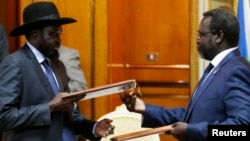JUBA —
South Sudanese President Salva Kiir and opposition leader Riek Machar have assured a senior U.S. State Department official that they will hold face-to-face talks when the next round of peace talks begins in Addis Ababa this week.
Counselor of the Department of State Thomas Shannon, who advises Secretary of State John Kerry on major foreign policy problems, told reporters that the two rivals made the pledge to him when he visited Juba over the weekend.
Mr. Kiir and Machar agreed to meet within a month when they signed an agreement in May, reaffirming their commitment to a ceasefire that has so far failed to take hold. Their meeting on May 9 was the first time they had met since South Sudan plunged into violence in mid-December.
Shannon said the May 9 agreement was a key step toward restoring peace in South Sudan. It not only restated both sides' commitment to a ceasefire, but also laid the groundwork for forming a transitional government and for bringing in a regional force to protect ceasefire monitors.
But ultimately, Shannon said, the success of the peace process will depend on the extent to which ordinary South Sudanese are involved in deciding the future of their country.
"It’s really going to be up to the people of South Sudan to determine how their government is going to look," he said.
"But with the help of regional partners, with the help of mediators, with help of the U.N. and the African Union, I believe we can create an environment in which that government will actually be able to create a peaceful space that will allow for the immediate needs of South Sudan to be met," he said.
The regional bloc mediating the peace talks, the Intergovernmental Authority on Development (IGAD), appears to be thinking along the same lines. Last week, IGAD brought together representatives of South Sudanese civil society, political parties, faith-based groups and traditional leaders for a symposium to brainstorm ways to end the conflict and discuss how to move the country forward once the fighting has stopped.
IGAD has agreed to expand the number of parties at the talks, which are due to get back under way on Tuesday. The next round of talks will include not only the government and opposition but also representatives of civil society, political parties and a group of politicians who were detained when the fighting started in December.
Shannon is expected to travel to the Ethiopian capital this week for the talks. He will be accompanied by U.S. Special Envoy to Sudan and South Sudan, Donald Booth.
Counselor of the Department of State Thomas Shannon, who advises Secretary of State John Kerry on major foreign policy problems, told reporters that the two rivals made the pledge to him when he visited Juba over the weekend.
Mr. Kiir and Machar agreed to meet within a month when they signed an agreement in May, reaffirming their commitment to a ceasefire that has so far failed to take hold. Their meeting on May 9 was the first time they had met since South Sudan plunged into violence in mid-December.
People's voice must be heard
Shannon said the May 9 agreement was a key step toward restoring peace in South Sudan. It not only restated both sides' commitment to a ceasefire, but also laid the groundwork for forming a transitional government and for bringing in a regional force to protect ceasefire monitors.
But ultimately, Shannon said, the success of the peace process will depend on the extent to which ordinary South Sudanese are involved in deciding the future of their country.
"It’s really going to be up to the people of South Sudan to determine how their government is going to look," he said.
"But with the help of regional partners, with the help of mediators, with help of the U.N. and the African Union, I believe we can create an environment in which that government will actually be able to create a peaceful space that will allow for the immediate needs of South Sudan to be met," he said.
The regional bloc mediating the peace talks, the Intergovernmental Authority on Development (IGAD), appears to be thinking along the same lines. Last week, IGAD brought together representatives of South Sudanese civil society, political parties, faith-based groups and traditional leaders for a symposium to brainstorm ways to end the conflict and discuss how to move the country forward once the fighting has stopped.
IGAD has agreed to expand the number of parties at the talks, which are due to get back under way on Tuesday. The next round of talks will include not only the government and opposition but also representatives of civil society, political parties and a group of politicians who were detained when the fighting started in December.
Shannon is expected to travel to the Ethiopian capital this week for the talks. He will be accompanied by U.S. Special Envoy to Sudan and South Sudan, Donald Booth.





